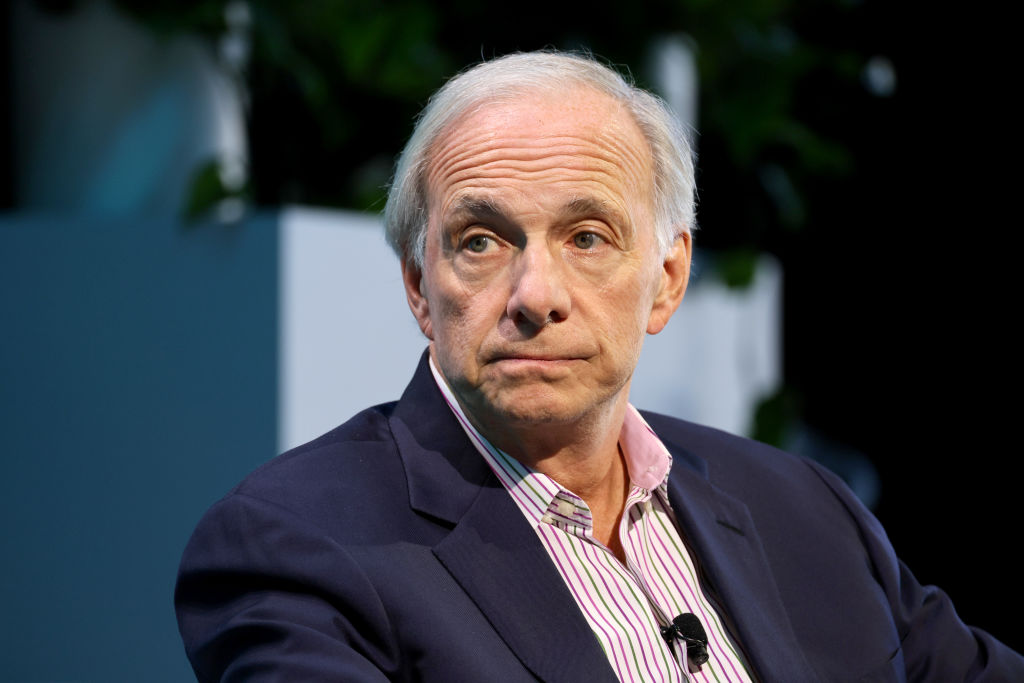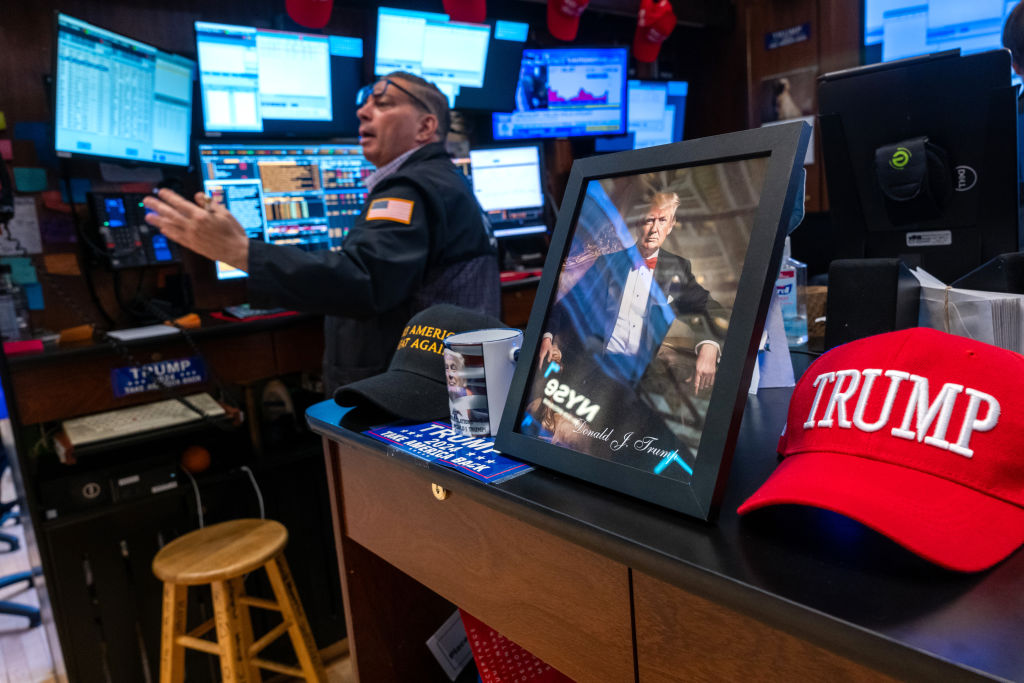Ray Dalio Is Ringing Alarm Bells About 'Something Worse Than a Recession'
The Bridgewater founder has been calling for people to look beyond the immediate panic of tariffs.


Profit and prosper with the best of Kiplinger's advice on investing, taxes, retirement, personal finance and much more. Delivered daily. Enter your email in the box and click Sign Me Up.
You are now subscribed
Your newsletter sign-up was successful
Want to add more newsletters?

Delivered daily
Kiplinger Today
Profit and prosper with the best of Kiplinger's advice on investing, taxes, retirement, personal finance and much more delivered daily. Smart money moves start here.

Sent five days a week
Kiplinger A Step Ahead
Get practical help to make better financial decisions in your everyday life, from spending to savings on top deals.

Delivered daily
Kiplinger Closing Bell
Get today's biggest financial and investing headlines delivered to your inbox every day the U.S. stock market is open.

Sent twice a week
Kiplinger Adviser Intel
Financial pros across the country share best practices and fresh tactics to preserve and grow your wealth.

Delivered weekly
Kiplinger Tax Tips
Trim your federal and state tax bills with practical tax-planning and tax-cutting strategies.

Sent twice a week
Kiplinger Retirement Tips
Your twice-a-week guide to planning and enjoying a financially secure and richly rewarding retirement

Sent bimonthly.
Kiplinger Adviser Angle
Insights for advisers, wealth managers and other financial professionals.

Sent twice a week
Kiplinger Investing Weekly
Your twice-a-week roundup of promising stocks, funds, companies and industries you should consider, ones you should avoid, and why.

Sent weekly for six weeks
Kiplinger Invest for Retirement
Your step-by-step six-part series on how to invest for retirement, from devising a successful strategy to exactly which investments to choose.
Bridgewater founder Ray Dalio has been sounding off about his concerns for the global economy and global future in general, ringing alarm bells that danger's afoot. He has been saying not only are we at risk of a recession, but of more disruption as a result of certain economic policies and other factors.
His comments come both online — he posted an essay to X, formerly known as Twitter, last week — and on television, as he spoke to NBC News' Meet the Press on Sunday. The 75-year-old has called on his listeners to look beyond the immediate shock of President Donald Trump's tariff announcements and see underlying factors that indicate instability.
"The far bigger, far more important thing to keep in mind is that we are seeing a classic breakdown of the major monetary, political, and geopolitical orders," Dalio wrote in his post on X. "This sort of breakdown occurs only about once in a lifetime, but they have happened many times in history when similar unsustainable conditions were in place."
From just $107.88 $24.99 for Kiplinger Personal Finance
Become a smarter, better informed investor. Subscribe from just $107.88 $24.99, plus get up to 4 Special Issues

Sign up for Kiplinger’s Free Newsletters
Profit and prosper with the best of expert advice on investing, taxes, retirement, personal finance and more - straight to your e-mail.
Profit and prosper with the best of expert advice - straight to your e-mail.
Dalio's predictions for the future and analysis of the present
Specifically, Dalio wrote, unsustainable conditions are a breaking down of...
- ...the "monetary/economic order" as a result of "too much existing debt" (i.e. the U.S. borrowing from China)
- ...political order due to rising inequities in opportunity and education
- ...geopolitical world order as the U.S. shifts to an "America-first" mentality
...as well as disruptive acts of nature, like floods and pandemics, and disruptive technology like AI.
Rather than looking at tariffs or Trump's election in a vacuum, he argues, it's part of a larger overall cycle in power and order (he explains the cycle concept further in his 2021 book Principles for Dealing with the Changing World Order).
David Payne, staff economist for The Kiplinger Letter, has a more measured take in response to Dalio: "Yes, these are concerns. Yes, Trump is accelerating some of these issues. But doomsday predictions tend to undervalue strengths, such as the productiveness of the capitalist system and the U.S. economy."
Following up on his writing, Dalio said on Meet the Press he is "worried about something worse than a recession if this isn't handled well." The billionaire, who said during the 2024 election the country needed a more moderate leader than either candidate, said the U.S. should cut the federal deficit to 3% of gross domestic product, or otherwise "we're going to have a supply-demand problem for debt at the same time as we have these other problems, and the results of that will be worse than a normal recession."
Particularly last week as the stock market reacted to Trump's tariff announcement, experts said a recession is increasingly likely in the face of economic and market disruptions caused by Trump's trade stances.
"Worse than a recession" to Dalio could mean a devaluation of money, internal conflict threatening democracy, and international conflict that could turn violent. He referred to our current situation and its combination of factors, which he called "a decision-making point," as "very much like the 1930s."
Dalio's past thoughts on politics and Trump

These are not particularly new comments for the hedge fund powerhouse. During the 2024 presidential election, Dalio also expressed concerns for the future of the U.S.
While he refused to endorse either candidate, calling it in a Time essay a "choice between a strong, unethical, almost fascist Republican Party and a frail, untruthful, and enigmatic Democratic Party," he did say he was worried democracy would be at risk if Trump were to lose but reject the results.
Speaking more broadly, he told BBC last September: "This reminds me of the 1930 to 45 period in which there was an economic crisis followed by democracies becoming dictatorships. Germany, Italy, Spain and Japan had parliamentary systems, and they broke down in terms of internal conflict between the the hard left, the hard right, communism and fascism. We are today seeing modern day versions of some of these things."
Payne, the Kiplinger Letter staff economist, also sees echoes of the past, but with more optimism than Dalio.
"Adjustments will be made, and perhaps some GDP growth points foregone, but we've muddled through crises before," Payne said. He pointed to the tumult of the 1960s-70s between war, Nixon's resignation, gas prices and social change.
"The stock market was moribund for a long time," Payne continued. "But the turbulence subsided in the '80s, and technological progress continued, setting the stage for the growth surge of the '90s. Of course, some of that growth surge was the result of globalization, which has begun to reverse, but there is a still a lot of promising tech out there."
Related Content
Profit and prosper with the best of Kiplinger's advice on investing, taxes, retirement, personal finance and much more. Delivered daily. Enter your email in the box and click Sign Me Up.

Alexandra Svokos is the digital managing editor of Kiplinger. She holds an MBA from NYU Stern in finance and management and a BA in economics and creative writing from Columbia University. Alexandra has over a decade of experience in journalism and previously served as the senior editor of digital for ABC News, where she directed daily news coverage across topics through major events of the early 2020s for the network's website, including stock market trends, the remote and return-to-work revolutions, and the national economy. Before that, she pioneered politics and election coverage for Elite Daily and went on to serve as the senior news editor for that group.
Alexandra was recognized with an "Up & Comer" award at the 2018 Folio: Top Women in Media awards, and she was asked twice by the Nieman Journalism Lab to contribute to their annual journalism predictions feature. She has also been asked to speak on panels and give presentations on the future of media and on business and media, including by the Center for Communication and Twipe.
-
 How Much It Costs to Host a Super Bowl Party in 2026
How Much It Costs to Host a Super Bowl Party in 2026Hosting a Super Bowl party in 2026 could cost you. Here's a breakdown of food, drink and entertainment costs — plus ways to save.
-
 3 Reasons to Use a 5-Year CD As You Approach Retirement
3 Reasons to Use a 5-Year CD As You Approach RetirementA five-year CD can help you reach other milestones as you approach retirement.
-
 Your Adult Kids Are Doing Fine. Is It Time To Spend Some of Their Inheritance?
Your Adult Kids Are Doing Fine. Is It Time To Spend Some of Their Inheritance?If your kids are successful, do they need an inheritance? Ask yourself these four questions before passing down another dollar.
-
 The 4 Estate Planning Documents Every High-Net-Worth Family Needs (Not Just a Will)
The 4 Estate Planning Documents Every High-Net-Worth Family Needs (Not Just a Will)The key to successful estate planning for HNW families isn't just drafting these four documents, but ensuring they're current and immediately accessible.
-
 Love and Legacy: What Couples Rarely Talk About (But Should)
Love and Legacy: What Couples Rarely Talk About (But Should)Couples who talk openly about finances, including estate planning, are more likely to head into retirement joyfully. How can you get the conversation going?
-
 How to Get the Fair Value for Your Shares When You Are in the Minority Vote on a Sale of Substantially All Corporate Assets
How to Get the Fair Value for Your Shares When You Are in the Minority Vote on a Sale of Substantially All Corporate AssetsWhen a sale of substantially all corporate assets is approved by majority vote, shareholders on the losing side of the vote should understand their rights.
-
 Dow Leads in Mixed Session on Amgen Earnings: Stock Market Today
Dow Leads in Mixed Session on Amgen Earnings: Stock Market TodayThe rest of Wall Street struggled as Advanced Micro Devices earnings caused a chip-stock sell-off.
-
 How to Add a Pet Trust to Your Estate Plan: Don't Leave Your Best Friend to Chance
How to Add a Pet Trust to Your Estate Plan: Don't Leave Your Best Friend to ChanceAdding a pet trust to your estate plan can ensure your pets are properly looked after when you're no longer able to care for them. This is how to go about it.
-
 Want to Avoid Leaving Chaos in Your Wake? Don't Leave Behind an Outdated Estate Plan
Want to Avoid Leaving Chaos in Your Wake? Don't Leave Behind an Outdated Estate PlanAn outdated or incomplete estate plan could cause confusion for those handling your affairs at a difficult time. This guide highlights what to update and when.
-
 I'm a Financial Adviser: This Is Why I Became an Advocate for Fee-Only Financial Advice
I'm a Financial Adviser: This Is Why I Became an Advocate for Fee-Only Financial AdviceCan financial advisers who earn commissions on product sales give clients the best advice? For one professional, changing track was the clear choice.
-
 Nasdaq Slides 1.4% on Big Tech Questions: Stock Market Today
Nasdaq Slides 1.4% on Big Tech Questions: Stock Market TodayPalantir Technologies proves at least one publicly traded company can spend a lot of money on AI and make a lot of money on AI.